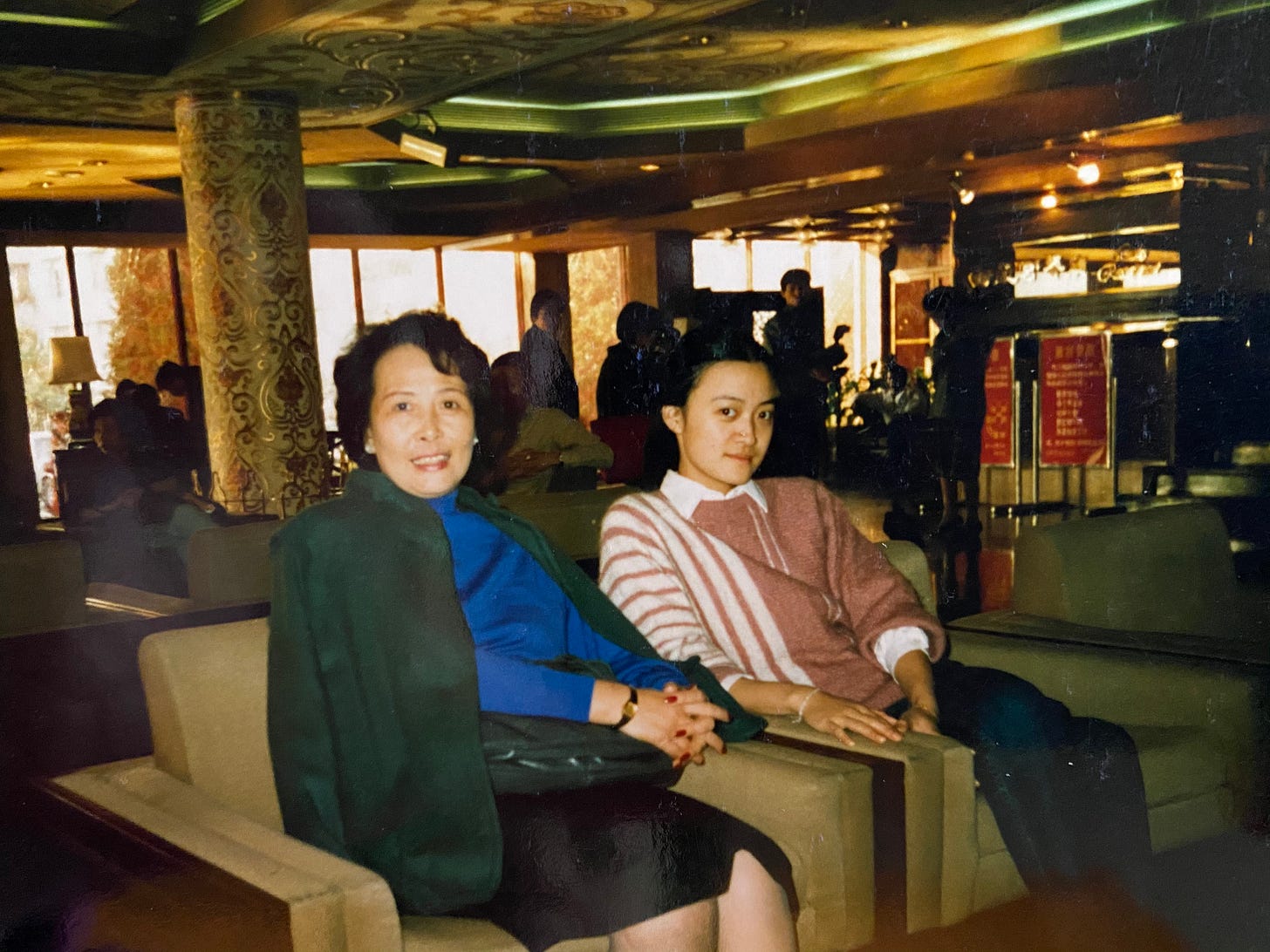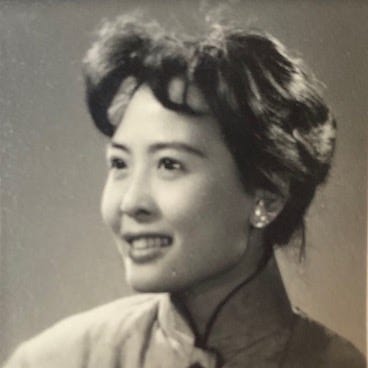At the Lunar New Year, Remembering "Auntie Mommy"
Yi Xue reflects on a woman who was like a second mother to her, and the culture she was brought up in.
When it comes to birthdays, older Chinese generations always refer to the lunar calendar. Nowadays, it’s more common to rely on the western Gregorian calendar for birthday celebrations almost exclusively, call it western cultural influence or invasion. In fact, all official records and IDs use birthdays based on Gregorian calendar. One can hardly remember his or her own lunar birthday, let alone someone else’s, given how they change from year-to-year in their corresponding Gregorian dates. I, however, have never missed anyone’s lunar birthday in my big extended family, without the need to ever actually remember them. I had Auntie-Mommy, my mother’s younger sister.
Not only did Auntie-Mommy remember everyone’s lunar birthday; before you even realized it was your birthday, she would always be the first one to send birthday congratulations, whether it was two perfectly poached eggs laying in fermented rice soup at the breakfast table for those who lived in our family house, or a wake-up phone call for those who lived across the country, or even the globe. With the rising popularity of social network platforms over the past decade, these early morning phone calls digitally transformed into messages sent via WeChat family group, the Chinese equivalent of Facebook group. I’d often wake up to a string of WeChat messages led by Auntie-Mommy’s birthday wish, dotted with animated birthday cakes and balloons, and her cheerful voice message: “Happy Birthday sweetheart! Ask your hubby to cook you something nice!”
Not only did Auntie-Mommy remember everyone’s lunar birthday, before you even realized it was your birthday, she would always be the first one to send birthday congratulations, whether it was two perfectly poached eggs laying in fermented rice soup at the breakfast table for those who lived in our family house, or a wake-up phone call for those who lived across the country, or even the globe.
Mom was the eldest of her six siblings. Our family of four lived in the same French style garden terrace house in Shanghai, with Grandpa A-Gong and Grandma A-Puo. It was not uncommon for the first born to live with the parents, creating a traditional multi-generation living arrangement. In our three-generation family house, mom’s brothers and sisters, together with their extended families, would always join us on major holidays. Auntie, mom’s sister who was just a year younger, moved into the spare room on the top floor with her husband, soon after he lost his family estate to the government at the beginning of the cultural revolution. Auntie was a nurse and later worked as a hospital laboratory technician. She left her hospital job due to a heart condition when she was still in her early 40’s.
In my memory, Auntie had always been part of our family and had never worked outside of the home since she moved in. Mom, on the other hand, was what we could call an example of modern day “career woman.” She graduated from and later taught at the Shanghai Conservatory of Music. When she was not teaching at the conservatory or performing on stage, she would spend most of her time coaching students of all ages at our home. Auntie took on the motherly duties of taking care of my younger sister and me, most of the time.
It was ironic that she did not do much tending of her own two children from her first marriage, a marriage she entered at the tender age of 17, and at the end of which, lost a nasty custody battle. She and her second husband never had any children of their own. My sister and I became the daughters they never had. Just like that, “Auntie” became “Auntie-Mommy.” She enjoyed, and was secretly proud of, what that name represented.
Lunar New Year is my most favorite Chinese holiday. It is the equivalent of the sum of Thanksgiving and New Year’s here in the States. New Year’s Eve dinner is THE family feast of the year and Auntie Mommy held the most important role of that feast: the head chef and curator of the menu.
I grew up in the 70s, during the post-cultural revolution era. Dining out and shopping for ready-made outfits were unthinkable luxuries. “DIY and we are self-sufficient” was a popular slogan encouraged by the government and chanted by the entire society. DIY (as in “do it yourself”) became the “talent show” for the ladies of the households. In our house, Auntie-Mommy was that lady.
Growing up, I was an awkward and lanky kid. In my memory, clothes were more often too short than long. When it was time for new clothes, be it sweaters, leggings, or jackets, even winter thermo-shoes (yes there were such things), Auntie-Mommy served as our family tailor.
Knitting seemed to always occupy her, as she sat around the table chitchatting or watching soap operas on a black-and-white 12-inch TV screen. Plain yarns were transformed into scarves and sweaters with creative patterns in her hands, while the stories unfolded on TV. Oh, and the cotton-wool winter thermo-shoes with hand stitched soles! As kids we hated these bulky shoes, even though they offered the best insulation during the coldest winter months. We were often teased, even bullied at school, for wearing such unfashionable footwear. Now, during cold Pacific Northwest long winters, how I long for a pair of these comfortable, warm, and funny looking shoes! I miss that warmth, as well as the love that was stitched into them.
Winters in Shanghai could be just as cold and wet as here in Washington, the Evergreen state. Back then, there were no home heating systems. Indoor temperatures could dip as low as outside temperatures. Auntie-Mommy would often use our afternoon nap time to lengthen an undershirt’s sleeves for us, with the cutouts from old clothes. To this day, I can still close my eyes and feel the warmth provided by those sleeves that magically got extended to cover the base of my palms.
During the culture-revolution, which took place between 1966 and 1976, Chinese traditions were referred to as “old things,” or the “four olds”— old customs, old culture, old habits, and old ideas. According to the government, old things were supposed to be destroyed, or “cleansed” out from our daily lives, together with any individuality. Everyone, men and women, old and young, called each other “comrades.” Everyone dressed in grey or blue, and when it came to haircut styles, every man had a crew cut and every woman had a Bob. But from a very early age, I learned from Auntie-Mommy that life could be lived differently, and women could look and act more like “ladies” than “soldiers.”
When Mom was not teaching at the conservatory or performing on stage, she would spend most of her time coaching students of all ages at our home. Auntie took on the motherly duties of taking care of my younger sister and me, most of the time.
She lived with her husband in a small room with vaulted ceilings in the attic of our house. A dresser and a double bed with a tiny nightstand filled the entire room, so the bed also served the function of chairs. But the dresser in that tiny room was something of an attraction for a young girl: it was lined with colorful and cute perfume bottles, and a ballerina-figurine decorated music box filled with hair pins and combs with shiny cubic zirconias. These “treasures” had escaped the fate of being “cleansed” out. I would often linger in front of the dresser, running my skinny fingers over the shiny fake diamonds, and daydream about being a grown-up lady, pretty and graceful.
Tucked into the lower corner of the dresser mirror was a color photo of a young Auntie-Mommy, beautiful like a movie star, her eyes looking ahead, her smile filled with an obvious confidence in her own beauty. Her hair always looked like she had just exited a beauty salon. Her nails were always perfectly trimmed and buffed. Later, when the government loosened its grip on how its people could revive and embrace tradition, along with western culture, Auntie-Mommy’s nails would always be manicured in bright colors that matched her lip gloss. And she kept up the nail and hair care ritual into her late 80’s.
I still have this image of Auntie-Mommy, sitting by the kitchen table with cigarette in hand: “Honey, there are no ugly people, only lazy ones,” she would say, imparting her wisdom to me with her nonchalance. It was Auntie-Mommy who taught me that a lady should always keep a bit of mystery about of herself and never undress in front of anyone, not even the husband. This may sound laughably retrograde now and seriously raise some eye-brows. I don’t necessarily endorse her view, but to this day I do still feel uncomfortable about undressing in front of anyone but myself. Funny how something you learned at a young age sticks with you.
“DIY and we are self-sufficient” was a popular slogan encouraged by the government and chanted by the entire society. DIY (as in “do it yourself”) became the “talent show” for the ladies of the households. In our house, Auntie-Mommy was that lady.
Lunar New Year is my most favorite Chinese holiday. It is the equivalent of the sum of Thanksgiving and New Year’s here in the States. New Year’s Eve dinner is THE family feast of the year and Auntie Mommy held the most important role of that feast: the head chef and curator of the menu. The image of her stationed in the kitchen is a constant backdrop to my memories of the New Year’s eve family feast. The actual number of extended family members gorging at the dinner table would vary from year to year, depending on who was able to travel in from all over the country. But there would always be more than twenty of us, celebrating in our garden terrace house in Shanghai.
We would all sit around a huge round dining table, laughing and eating. “Hot and noisy” was how we describe the dinner scene. During times when staple food items like pork, cooking oil, and egg had to be rationed, creating eight cold dishes followed by eight hot dishes, with soup and dessert as the grand finale, was like delivering magic. As a kid, I would be eagerly anticipating that magic months before the occasion. These dinners achieved near-state banquet style, not just in the number of courses, but also the required three qualities: taste, aroma, and color (a.k.a. presentation). Had there been Instagram in those days, I am sure Auntie-Mommy would have been a culinary and food influencer.
These dinners sure were hard work, with preparation started days before. On the day of the feast, after laboring for hours in the kitchen, she’d always light a cigarette, take a long drag, head tilted while blowing out the smoke. “I have been up since 6 this morning and this is the first chance I get to sit down,” she’d say, narrowing her eyes behind the smoky veil, brows knitted.
During the height of the Covid-19 pandemic, in September of 2020, Auntie-Mommy was diagnosed with stage IV lung cancer. Her decline was so rapid, it was difficult for me to grasp from another locked-down country 6000 miles away what was happening to her. On October 19th, less than a month after the diagnosis, Auntie-Mommy was gone.
“Sweetheart, here, I have saved a small portion of every dish on your plate for you,” my grandpa would say to her. Auntie-Mommy had always been his sweet daughter. All of us would gather around her and pile on our praises. “Oh well,” she’d say, “I am too tired to have an appetite, but as long as you all enjoyed, that will do for me.” A hint of smile would emerge, her tired eyes giving way to satisfaction, letting on how much she actually enjoyed the holiday and the hard work it required. Witnessing that smile had led me to believe New Year’s Eve dinners would always be this “hot and noisy,” always full of good food, joy, and love, for ever. Similarly, I believed I would always have no need to remember anyone’s lunar birthdays, and be that lucky girl to have two loving mother figures forever.
Then reality intruded. During the height of the Covid-19 pandemic, in September of 2020, Auntie-Mommy was diagnosed with stage IV lung cancer. Her decline was so rapid, it was difficult for me to grasp from another locked-down country 6000 miles away what was happening to her. On October 19th, less than a month after the diagnosis, Auntie-Mommy was gone.
We never had the chance to say goodbye. I often find myself wandering to our WeChat messages on my phone. I marvel at her profile photo, wearing sunglasses while having Dim Sum, so fashionable, so Auntie-Mommy. But I am not brave enough to open our last chat, in which she gave me an animated thumbs up emoji after I proudly shared my shelter-at-home cooking photos.
Sometimes I’ll have this urge to send her a message about what’s happening in my life, but I’ll stop short of typing out the message—I am not brave enough to carry on a one-way conversation after all. This digital world of ours can otherwise allow me to pretend that, just like those New Year’s Eve dinner banquets in Shanghai that I thought would go on forever, Auntie-Mommy is still here. I am struggling to confront reality. So, for now, I will visit our Chat Room, and wish Auntie-Mommy a happy new year silently, in my heart.
Next November 23rd, is Auntie-Mommy’s 89th lunar birthday. On that morning, I want to be the first one to say, “Happy birthday Auntie-Mommy!”










Such a beautiful tribute to your “auntie mommy” and to a time gone by. I love it. It brought tears to my eyes. I can picture the Shanghai terrace house.
Thanks for your reminisce of " Auntie Mommy". You were lucky to have had her in your life.